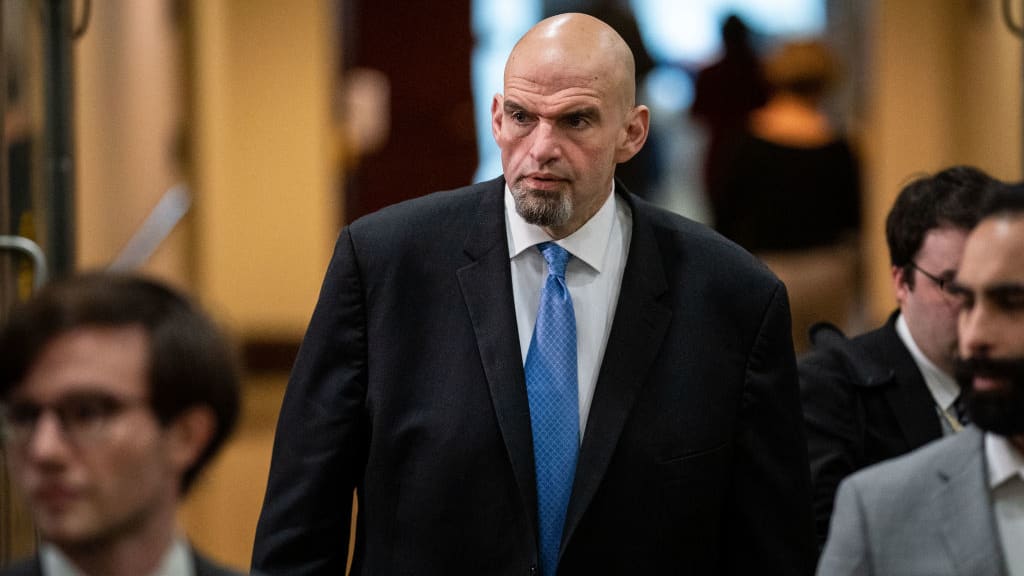Sen. John Fetterman receiving treatment for clinical depression


A free daily email with the biggest news stories of the day – and the best features from TheWeek.com
You are now subscribed
Your newsletter sign-up was successful
Sen. John Fetterman (D-Pa.) is seeking treatment for clinical depression, at the recommendation of the attending physician of Congress.
The doctor, Brian P. Monahan, evaluated the senator on Monday and suggested inpatient care on Wednesday, Fetterman's chief of staff, Adam Jentleson, said in a statement released Thursday. Fetterman has "experienced depression off and on throughout his life," Jentleson added, and "it only became severe in recent weeks. After examining John, the doctors at Walter Reed [National Military Medical Center] told us that John is getting the care he needs, and will soon be back to himself."
Fetterman, 53, suffered a stroke last May, just a few days before winning the Democratic Senate primary. He defeated Republican Mehmet Oz in November, after speaking openly on the campaign trail about his recovery. Last week, Fetterman experienced lightheadedness during a retreat, and was hospitalized; his spokesman said doctors determined Fetterman did not have a second stroke.
The Week
Escape your echo chamber. Get the facts behind the news, plus analysis from multiple perspectives.

Sign up for The Week's Free Newsletters
From our morning news briefing to a weekly Good News Newsletter, get the best of The Week delivered directly to your inbox.
From our morning news briefing to a weekly Good News Newsletter, get the best of The Week delivered directly to your inbox.
James Jackson, director of the ICU Recovery Center at Vanderbilt Medical Center, told The Washington Post that studies show about 30 percent of people who survive life-threatening medical events and intensive care go on to have symptoms of depression, including sadness, fatigue, brain fog, increased social withdrawal, and reduced motivation and appetite. "It's not a situation you anticipated. It's not something you planned on. That's why it's so derailing," Jackson said. "There's an abruptness to it."
Experts say the risk of depression is likely greater in people who have suffered strokes, since there is an injury to the brain and they often lose physical mobility and auditory processing. "There are studies that show that compared to all other forms of depression, stroke-induced depression tends to be more severe," Joshua Gordon, director of the National Institute of Mental Health, told the Post.
Several lawmakers sent their well wishes to Fetterman after Thursday's announcement, and shared their own mental health experiences. Rep. Ritchie Torres (D-N.Y.) revealed that in 2010, he was hospitalized for depression. "I would not be alive, let alone in Congress, were it not for mental health care," Torres tweeted. "Millions of Americans are rooting for you, Senator."
A free daily email with the biggest news stories of the day – and the best features from TheWeek.com
Catherine Garcia has worked as a senior writer at The Week since 2014. Her writing and reporting have appeared in Entertainment Weekly, The New York Times, Wirecutter, NBC News and "The Book of Jezebel," among others. She's a graduate of the University of Redlands and the Columbia University Graduate School of Journalism.
-
 Political cartoons for February 16
Political cartoons for February 16Cartoons Monday’s political cartoons include President's Day, a valentine from the Epstein files, and more
-
 Regent Hong Kong: a tranquil haven with a prime waterfront spot
Regent Hong Kong: a tranquil haven with a prime waterfront spotThe Week Recommends The trendy hotel recently underwent an extensive two-year revamp
-
 The problem with diagnosing profound autism
The problem with diagnosing profound autismThe Explainer Experts are reconsidering the idea of autism as a spectrum, which could impact diagnoses and policy making for the condition
-
 Judge blocks Hegseth from punishing Kelly over video
Judge blocks Hegseth from punishing Kelly over videoSpeed Read Defense Secretary Pete Hegseth pushed for the senator to be demoted over a video in which he reminds military officials they should refuse illegal orders
-
 Trump’s EPA kills legal basis for federal climate policy
Trump’s EPA kills legal basis for federal climate policySpeed Read The government’s authority to regulate several planet-warming pollutants has been repealed
-
 House votes to end Trump’s Canada tariffs
House votes to end Trump’s Canada tariffsSpeed Read Six Republicans joined with Democrats to repeal the president’s tariffs
-
 Bondi, Democrats clash over Epstein in hearing
Bondi, Democrats clash over Epstein in hearingSpeed Read Attorney General Pam Bondi ignored survivors of convicted sex offender Jeffrey Epstein and demanded that Democrats apologize to Trump
-
 El Paso airspace closure tied to FAA-Pentagon standoff
El Paso airspace closure tied to FAA-Pentagon standoffSpeed Read The closure in the Texas border city stemmed from disagreements between the Federal Aviation Administration and Pentagon officials over drone-related tests
-
 Judge blocks Trump suit for Michigan voter rolls
Judge blocks Trump suit for Michigan voter rollsSpeed Read A Trump-appointed federal judge rejected the administration’s demand for voters’ personal data
-
 US to send 200 troops to Nigeria to train army
US to send 200 troops to Nigeria to train armySpeed Read Trump has accused the West African government of failing to protect Christians from terrorist attacks
-
 Grand jury rejects charging 6 Democrats for ‘orders’ video
Grand jury rejects charging 6 Democrats for ‘orders’ videoSpeed Read The jury refused to indict Democratic lawmakers for a video in which they urged military members to resist illegal orders
